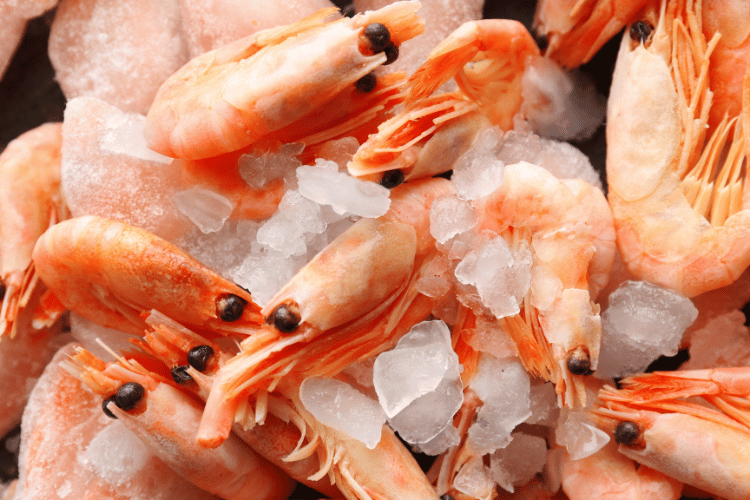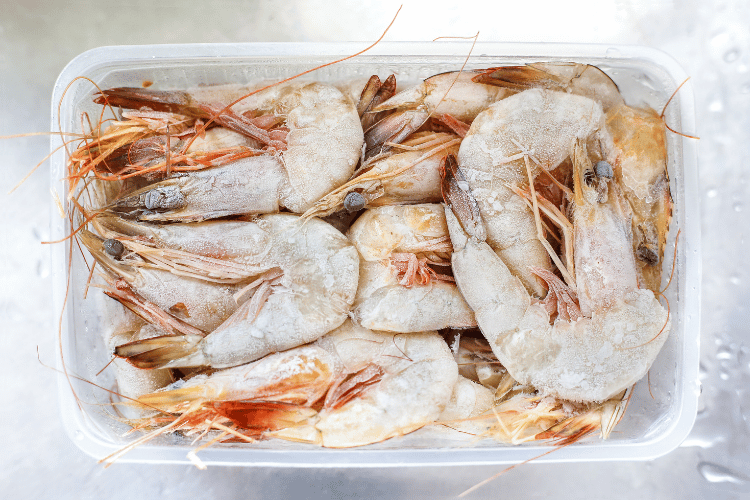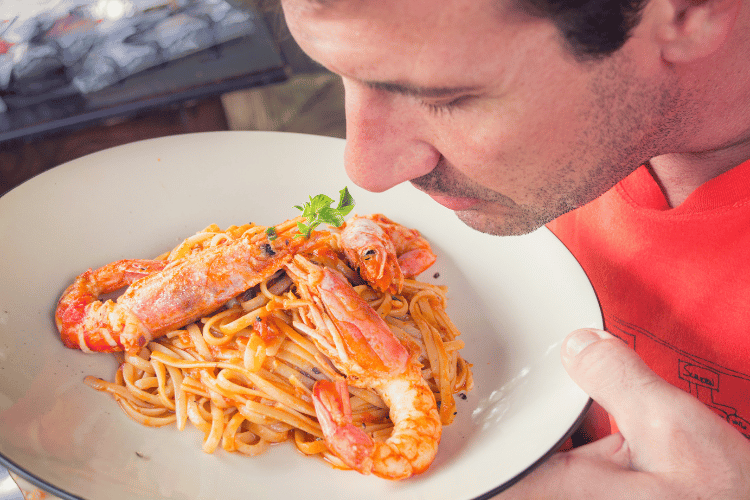So you got a bargain on a huge bag of shrimp last week, but when you get it out of the freezer, you can’t stand the fishy smell. Now you’re wondering, should frozen shrimp smell fishy?

Generally, shrimp and other seafood shouldn’t smell when frozen. In case your shrimp are smelling too hard, there’s a huge chance they went bad.
If you don’t want to end up with a bag of soiled shrimp, read on to understand how to spot spoiled seafood.
How to Determine If Frozen Shrimp Are Bad?
Shrimp should be immediately frozen after being harvested to keep them fresh and retain their texture and flavor. That’s why shrimp and other seafood are displayed in refrigerators and freezers in food stores.
Shrimp can easily go bad if exposed to warm temperatures, even for short periods. This can happen if they’re not properly frozen when transported from the fishing port to the grocery store.
According to the FDA, these are the essential tips you should follow when buying frozen shrimp:
- Fresh seafood like shrimp and crabs should smell mild and fresh; avoid buying fish or shrimp that smells fishy or ammonia-like
- Check the shrimp’s flesh; it should be clear and have a pearl-like color with little to no smell.
- Only buy fresh shrimp that are displayed within a thick layer of ice crystals.
- Stay away from shrimp that have a pale or slimy texture. Properly stored shrimp should be translucent and shiny.
- Check the shells; they should be smooth and firm.
- The shrimp’s meat should be pure white. Slightly pink meat can be a sign of deterioration or spoilage.
- Avoid buying shrimp that show brown spots as they’re a sign of spoiled shrimp
- Check the time and temperature indicators on the packaging to ensure the shrimp are adequately frozen. Only buy products that are considered safe to eat.
How to Store Frozen Shrimp
Now that you’ve bought your shrimp, it’s time to store them properly. If you plan to cook the shrimp within two days, you can safely store them in your refrigerator if the temperature is below 40°F.
If you’re not going to cook the shrimp within two days of the purchase date, then store them in the freezer.
How to Thaw Frozen Shrimp
It’s essential to thaw your shrimp before cooking to preserve the texture and flavor and make sure every bite is properly cooked.

There are various ways to go around this—whether you’re in a hurry or preparing a meal for the next day.
Refrigerator Thawing
If you want to prepare shrimp for tomorrow’s lunch or a sunday brunch, you won’t have to do much. All you have to do is take the shrimp out of the freezer, then place them in the fridge overnight. Make sure to place the bag on a platter or a baking sheet to soak up any leaks.
Allow your shrimp to thaw for up to 24 hours. Frozen shrimp usually need around 12 hours or more to thaw completely. It might take more or less depending on many factors, such as the size of each shrimp, the size of the bag, and the temperature.
Once thawed, your shrimp exterior should be translucent. They should also be flexible enough with no signs of interior ice.
Fast-Thawing
So you have unexpected guests for dinner and want to prepare a delicious seafood meal? Here’s how to thaw your shrimp in around 45 minutes:
- Remove your frozen shrimp from the freezer.
- Prepare a large bowl of cold water.
- Place the shrimp bag in the cold water and ensure it’s fully submerged. You can use a plate or a lid for that.
- Let your shrimp sit in cold water for around 45 minutes until they thaw completely.
- Transfer your shrimp bag onto a plate lined with paper towels to remove excess liquids.
- Now your shrimp should be ready to be cooked.
- If you need your shrimp thawed in less than 20 minutes, remove them from the bag and place them in a cold water bowl.
It’s worth noting that thawed frozen shrimp can be stored in the fridge for 48 hours at most.
Things to Avoid When Thawing Shrimp
The above methods should be more than enough to thaw your shrimp, no matter how fast you want to cook them.
However, some people aren’t aware of the risks associated with eating contaminated or improperly cooked seafood. Thus, they make the following common mistakes:
1. Using Warm Water
While it makes sense to use warm water to boost the thawing process, it’s completely unsafe to do so. That’s because warm water creates an ideal environment for bacterial growth, which can lead to severe food poisoning.
Moreover, shrimp usually get cooked in a few minutes, so using warm water can begin premature cooking, resulting in a chewy texture and bad flavor.
2. Leaving Shrimp in Room Temperature
Shrimp, alongside other seafood, is full of proteins, which makes them an easy target for bacterial infections if left at a high temperature.
Of course, you don’t want to get nasty seafood poisoning, so it’s best to start thawing your shrimp immediately after removing them from the freezer. If you leave the shrimp at room temperature for a long time, it can easily get spoiled.

3. Microwaving Shrimp
We know microwaves can be fast and efficient, but they’re not that good at thawing shrimp and fish. That’s mainly because microwaves heat unevenly, making the shrimp chewy, bouncy, and unevenly cooked.
So it’s best to avoid using microwaves for thawing seafood and stick to the mentioned thawing methods to get the most out of your frozen shrimp.
To Wrap Up
So answering the question: Should frozen shrimp smell fishy?
No, frozen shrimp and other seafood shouldn’t smell. If your frozen shrimp are smelling fishy, they might have gone bad.
Shrimp tend to spill too quickly; which is why they’re immediately frozen once out of the water and until they reach grocery stores. That’s why you always see shrimp and seafood displayed in thick layers of ice.
- Bavarois vs Mousse: A Delicious Journey through Creamy Desserts - April 30, 2024
- How To Fill a King Cake With Bavarian Cream - April 15, 2024
- Dealing With Mold on Oyster Mushrooms - April 9, 2024

